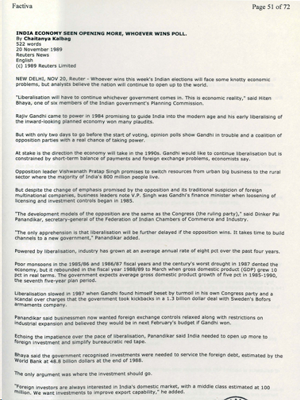INDIA ECONOMY SEEN OPENING MORE, WHOEVER WINS POLL
[Reuters]
Published date: 20th Nov 1989
20 November 1989
Reuters News
English
(c) 1989 Reuters Limited
NEW DELHI, NOV 20, Reuter – Whoever wins this week’s Indian elections will face some knotty economic problems, but analysts believe the nation will continue to open up to the world.
“Liberalisation will have to continue whichever government comes in. This is economic reality,” said Hiten Bhaya, one of six members of the Indian government’s Planning Commission.
Rajiv Gandhi came to power in 1984 promising to guide India into the modern age and his early liberalising of the inward-looking planned economy won many plaudits.
But with only two days to go before the start of voting, opinion polls show Gandhi in trouble and a coalition of opposition parties with a real chance of taking power.
At stake is the direction the economy will take in the 1990s. Gandhi would like to continue liberalisation but is constrained by short-term balance of payments and foreign exchange problems, economists say.
Opposition leader Vishwanath Pratap Singh promises to switch resources from urban big business to the rural sector where the majority of India’s 800 million people live.
But despite the change of emphasis promised by the opposition and its traditional suspicion of foreign multinational companies, business leaders note V.P. Singh was Gandhi’s finance minister when loosening of licensing and investment controls began in 1985.
“The development models of the opposition are the same as the Congress (the ruling party),” said Dinker Pai Panandikar, secretary-general of the Federation of Indian Chambers of Commerce and Industry.
“The only apprehension is that liberalisation will be further delayed if the opposition wins. It takes time to build channels to a new government,” Panandikar added.
Powered by liberalisation, industry has grown at an average annual rate of eight pct over the past four years.
Poor monsoons in the 1985/86 and 1986/87 fiscal years and the century’s worst drought in 1987 dented the economy, but it rebounded in the fiscal year 1988/89 to March when gross domestic product (GDP) grew 10 pct in real terms. The government expects average gross domestic product growth of five pct in 1985-1990, the seventh five-year plan period.
Liberalisation slowed in 1987 when Gandhi found himself beset by turmoil in his own Congress party and a scandal over charges that the government took kickbacks in a 1.3 billion dollar deal with Sweden’s Befors armaments company.
Panandikar said businessmen now wanted foreign exchange controls relaxed along with restrictions on industrial expansion and believed they would be in next February’s budget if Gandhi won.
Echoing the impatience over the pace of liberalisation, Panandikar said India needed to open up more to foreign investment and simplify bureaucratic red tape.
Bhaya said the government recognised investments were needed to service the foreign debt, estimated by the World Bank at 48.8 billion dollars at the end of 1988.
The only argument was where the investment should go.
“Foreign investors are always interested in India’s domestic market, with a middle class estimated at 100 million. we want investments to improve export capability,” he added.






